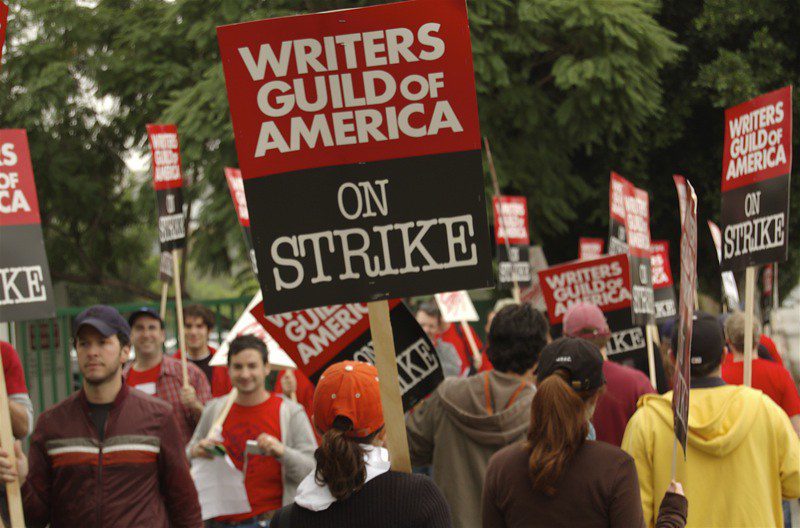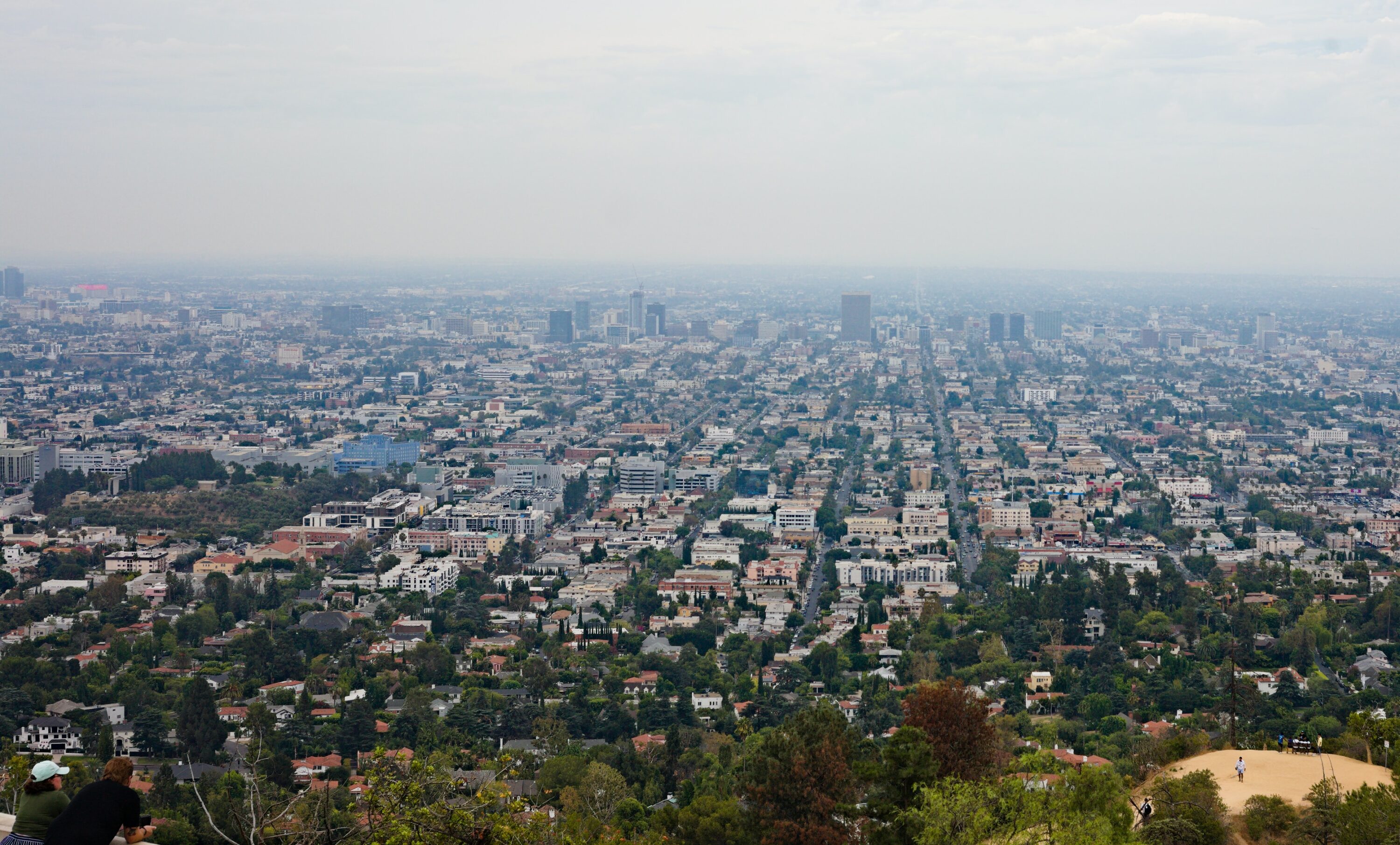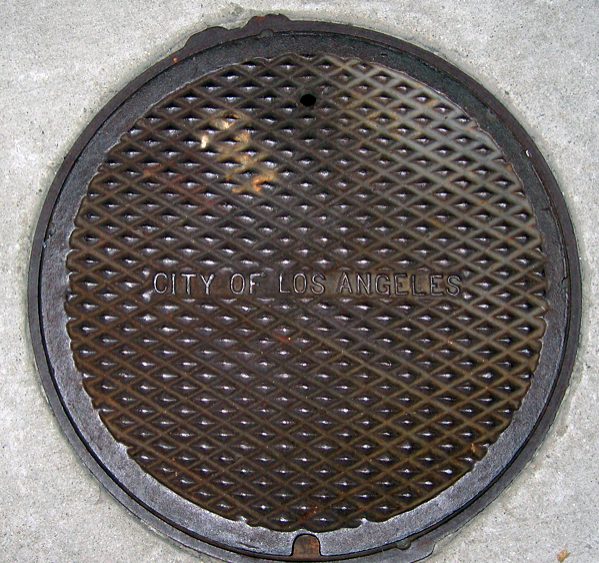Picket lines went up outside all the major L.A.-area studios yet again Tuesday as the Writers Guild of America strike continued for a third week — with no word on renewed labor talks or movement toward resolution of a walkout that has ground entertainment production to a halt.
Since the strike began May 2, pickets have become the daily routine at Amazon Studio in Culver City, CBS’ Studio City lot, Television City, The Walt Disney Co.’s corporate headquarters in Burbank, the Fox Studios lot, Netflix’s Hollywood headquarters, Paramount Studios in Hollywood, Sony Studios in Culver City, Universal Studios and Warner Bros. in Burbank.
In a weekly update to WGA members on Tuesday, the union negotiating committee wrote that the Alliance of Motion Picture and Television Producers — which represents the studios — “refuses to negotiate a fair deal to address the existential crisis writers are facing.”
The committee again insisted that its overall contract demands would collectively cost the studios $429 million annually, with $343 million of that total attributable to the eight largest employers.
“For perspective, tens of billions are spent on the programming writers create, $19 billion alone on original content for streaming services this year,” according to the committee. “And the cost of these proposed improvements is modest compared to industry revenues and profits, but are essential to writers whose pay and working conditions have eroded over the past decade.
“… These companies have made billions in profit off writers’ work, and they tell their investors every quarter about the importance of scripted content. Yet they are risking significant continued disruption in the coming weeks and months that would far outweigh the costs of settling.”
The WGA is pushing for improvements on a variety of fronts, notably for higher residual pay for streaming programs that have larger viewership, rather than the existing model that pays a standard rate regardless of a show’s success.
The union is also calling for industry standards on the number of writers assigned to each show, increases in foreign streaming residuals and regulations preventing the use of artificial intelligence technology to write or rewrite any literary material.
The AMPTP has pushed back against some of the WGA’s demands, particularly around its calls for mandatory staffing and employment guarantees on programs.
“These proposals require studios to staff a show with a certain number of writers who will be hired for a specified period of time that may not align with the creative process,” according to the alliance. “If writing needs to be done, writers are hired, but these proposals require the employment of writers whether they’re needed for the creative process or not. While the WGA has argued that the proposal is necessary to `preserv(e) the writers’ room,’ it is in reality a hiring quota that is incompatible with the creative nature of our industry.”
AMPTP has also pushed back against WGA demands around streaming residuals, saying the guild’s offer would increase rates by 200%.
The use of artificial intelligence has also emerged as a major topic, with Congress even holding a hearing on the overall issue Tuesday.
The WGA says it wants a ban on the use of AI, and contends the AMPTP has refused to even negotiate the issue. The AMPTP said the issue raises “important creative and legal questions” and requires “a lot more discussion, which we’ve committed to doing.”
The strike has been having an impact on television viewing, with late night talk shows and “Saturday Night Live” all forced into reruns. This month’s “MTV Movie & TV Awards” event in Santa Monica was canceled in favor of a pre-taped event due to celebrities unwilling to cross WGA picket lines. Organizers of the Daytime Emmy Awards ceremonies, which were scheduled for next month in downtown Los Angeles, announced the events were being postponed due to the strike.
On Monday, the Peabody Awards, which were scheduled for June 11 at the Beverly Wilshire Hotel, were canceled altogether.
Last week, Vice President Kamala Harris backed out of her planned appearance at an MTV mental health awareness event in Carson set for Thursday of this week to avoid conflict with the WGA strike.
On Friday, the June 11 Tony Awards ceremony in New York became the latest show affected by the strike, with the WGA denying a request for a waiver that would have allowed the show to be broadcast as scheduled. But Monday, according to various reports out of New York, the WGA announced its East members would not picket the Tonys.
“Tony Awards Productions (a joint venture of the Broadway League and the American Theatre Wing) has communicated with us that they are altering this year’s show to conform with specific requests from the WGA, and therefore the WGA will not be picketing the show,” the WGA said, according to The Hollywood Reporter.
The last WGA strike lasted from November 2007 until February 2008. Industry experts estimated the 100-day strike cost the local economy between $2 billion and $3 billion. With both sides appearing to still be at loggerheads, many observers fear the current walkout could last even longer.
Last week, the AMPTP also began labor talks with the Directors Guild of America, which is seeking to address many of the same issues involved in the WGA stalemate. The DGA’s contract with AMPTP expires June 30.
On June 7, the AMPTP is scheduled to begin negotiations with the SAG- AFTRA actors’ union, which has already come out in strong support of the striking writers.
“We are united in support of the WGA and I thank all of the SAG-AFTRA members who are showing solidarity with their strike,” SAG-AFTRA President Fran Drescher wrote in a message to its membership on Friday. “For those who haven’t yet been able to do so, I hope you will join me and others in supporting the writers on a picket line.
“… As a member of the WGA, I can say firsthand the contributions made by writers cannot be undermined, diminished or cheapened. I’ve said it a thousand times, `If it ain’t on the page, it ain’t on the stage!”‘







